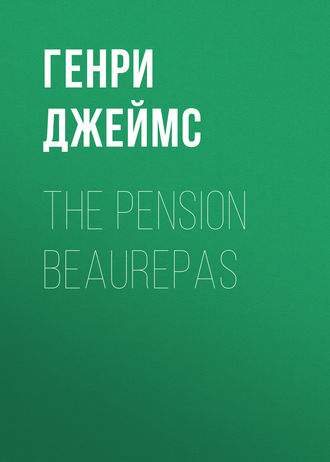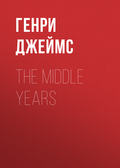
Генри Джеймс
The Pension Beaurepas
CHAPTER III
At breakfast I encountered his ladies—his wife and daughter. They were placed, however, at a distance from me, and it was not until the pensionnaires had dispersed, and some of them, according to custom, had come out into the garden, that he had an opportunity of making me acquainted with them.
"Will you allow me to introduce you to my daughter?" he said, moved apparently by a paternal inclination to provide this young lady with social diversion. She was standing with her mother, in one of the paths, looking about with no great complacency, as I imagined, at the homely characteristics of the place, and old M. Pigeonneau was hovering near, hesitating apparently between the desire to be urbane and the absence of a pretext. "Mrs. Ruck—Miss Sophy Ruck," said my friend, leading me up.
Mrs. Ruck was a large, plump, light-coloured person, with a smooth fair face, a somnolent eye, and an elaborate coiffure. Miss Sophy was a girl of one-and-twenty, very small and very pretty—what I suppose would have been called a lively brunette. Both of these ladies were attired in black silk dresses, very much trimmed; they had an air of the highest elegance.
"Do you think highly of this pension?" inquired Mrs. Ruck, after a few preliminaries.
"It's a little rough, but it seems to me comfortable," I answered.
"Does it take a high rank in Geneva?" Mrs. Ruck pursued.
"I imagine it enjoys a very fair fame," I said, smiling.
"I should never dream of comparing it to a New York boarding-house," said Mrs. Ruck.
"It's quite a different style," her daughter observed.
Miss Ruck had folded her arms; she was holding her elbows with a pair of white little hands, and she was tapping the ground with a pretty little foot.
"We hardly expected to come to a pension," said Mrs. Ruck. "But we thought we would try; we had heard so much about Swiss pensions. I was saying to Mr. Ruck that I wondered whether this was a favourable specimen. I was afraid we might have made a mistake."
"We knew some people who had been here; they thought everything of Madame Beaurepas," said Miss Sophy. "They said she was a real friend."
"Mr. and Mrs. Parker—perhaps you have heard her speak of them," Mrs.
Ruck pursued.
"Madame Beaurepas has had a great many Americans; she is very fond of
Americans," I replied.
"Well, I must say I should think she would be, if she compares them with some others."
"Mother is always comparing," observed Miss Ruck.
"Of course I am always comparing," rejoined the elder lady. "I never had a chance till now; I never knew my privileges. Give me an American!" And Mrs. Ruck indulged in a little laugh.
"Well, I must say there are some things I like over here," said Miss Sophy, with courage. And indeed I could see that she was a young woman of great decision.
"You like the shops—that's what you like," her father affirmed.
The young lady addressed herself to me, without heeding this remark.
"I suppose you feel quite at home here."
"Oh, he likes it; he has got used to the life!" exclaimed Mr. Ruck.
"I wish you'd teach Mr. Ruck," said his wife. "It seems as if he couldn't get used to anything."
"I'm used to you, my dear," the husband retorted, giving me a humorous look.
"He's intensely restless," continued Mrs. Ruck.
"That's what made me want to come to a pension. I thought he would settle down more."
"I don't think I AM used to you, after all," said her husband.
In view of a possible exchange of conjugal repartee I took refuge in conversation with Miss Ruck, who seemed perfectly able to play her part in any colloquy. I learned from this young lady that, with her parents, after visiting the British Islands, she had been spending a month in Paris, and that she thought she should have died when she left that city. "I hung out of the carriage, when we left the hotel," said Miss Ruck, "I assure you I did. And mother did, too."
"Out of the other window, I hope," said I.
"Yes, one out of each window," she replied promptly. "Father had hard work, I can tell you. We hadn't half finished; there were ever so many places we wanted to go to."
"Your father insisted on coming away?"
"Yes; after we had been there about a month he said he had enough. He's fearfully restless; he's very much out of health. Mother and I said to him that if he was restless in Paris he needn't hope for peace anywhere. We don't mean to leave him alone till he takes us back." There was an air of keen resolution in Miss Ruck's pretty face, of lucid apprehension of desirable ends, which made me, as she pronounced these words, direct a glance of covert compassion toward her poor recalcitrant father. He had walked away a little with his wife, and I saw only his back and his stooping, patient-looking shoulders, whose air of acute resignation was thrown into relief by the voluminous tranquillity of Mrs. Ruck. "He will have to take us back in September, any way," the young girl pursued; "he will have to take us back to get some things we have ordered."
"Have you ordered a great many things?" I asked jocosely.
"Well, I guess we have ordered SOME. Of course we wanted to take advantage of being in Paris—ladies always do. We have left the principal things till we go back. Of course that is the principal interest, for ladies. Mother said she should feel so shabby if she just passed through. We have promised all the people to be back in September, and I never broke a promise yet. So Mr. Ruck has got to make his plans accordingly."
"And what are his plans?"
"I don't know; he doesn't seem able to make any. His great idea was to get to Geneva; but now that he has got here he doesn't seem to care. It's the effect of ill health. He used to be so bright; but now he is quite subdued. It's about time he should improve, any way. We went out last night to look at the jewellers' windows—in that street behind the hotel. I had always heard of those jewellers' windows. We saw some lovely things, but it didn't seem to rouse father. He'll get tired of Geneva sooner than he did of Paris."
"Ah," said I, "there are finer things here than the jewellers' windows. We are very near some of the most beautiful scenery in Europe."
"I suppose you mean the mountains. Well, we have seen plenty of mountains at home. We used to go to the mountains every summer. We are familiar enough with the mountains. Aren't we, mother?" the young lady demanded, appealing to Mrs. Ruck, who, with her husband, had drawn near again.
"Aren't we what?" inquired the elder lady.
"Aren't we familiar with the mountains?"
"Well, I hope so," said Mrs. Ruck.
Mr. Ruck, with his hands in his pockets, gave me a sociable wink.—
"There's nothing much you can tell them!" he said.
The two ladies stood face to face a few moments, surveying each other's garments. "Don't you want to go out?" the young girl at last inquired of her mother.
"Well, I think we had better; we have got to go up to that place."
"To what place?" asked Mr. Ruck.
"To that jeweller's—to that big one."
"They all seemed big enough; they were too big!" And Mr. Ruck gave me another wink.
"That one where we saw the blue cross," said his daughter.
"Oh, come, what do you want of that blue cross?" poor Mr. Ruck demanded.
"She wants to hang it on a black velvet ribbon and tie it round her neck," said his wife.
"A black velvet ribbon? No, I thank you!" cried the young lady. "Do you suppose I would wear that cross on a black velvet ribbon? On a nice little gold chain, if you please—a little narrow gold chain, like an old-fashioned watch-chain. That's the proper thing for that blue cross. I know the sort of chain I mean; I'm going to look for one. When I want a thing," said Miss Ruck, with decision, "I can generally find it."
"Look here, Sophy," her father urged, "you don't want that blue cross."
"I do want it—I happen to want it." And Sophy glanced at me with a little laugh.
Her laugh, which in itself was pretty, suggested that there were various relations in which one might stand to Miss Ruck; but I think I was conscious of a certain satisfaction in not occupying the paternal one. "Don't worry the poor child," said her mother.
"Come on, mother," said Miss Ruck.
"We are going to look about a little," explained the elder lady to me, by way of taking leave.
"I know what that means," remarked Mr. Ruck, as his companions moved away. He stood looking at them a moment, while he raised his hand to his head, behind, and stood rubbing it a little, with a movement that displaced his hat. (I may remark in parenthesis that I never saw a hat more easily displaced than Mr. Ruck's.) I supposed he was going to say something querulous, but I was mistaken. Mr. Ruck was unhappy, but he was very good-natured. "Well, they want to pick up something," he said. "That's the principal interest, for ladies."
CHAPTER IV
Mr. Ruck distinguished me, as the French say. He honoured me with his esteem, and, as the days elapsed, with a large portion of his confidence. Sometimes he bored me a little, for the tone of his conversation was not cheerful, tending as it did almost exclusively to a melancholy dirge over the financial prostration of our common country. "No, sir, business in the United States is not what it once was," he found occasion to remark several times a day. "There's not the same spring—there's not the same hopeful feeling. You can see it in all departments." He used to sit by the hour in the little garden of the pension, with a roll of American newspapers in his lap and his high hat pushed back, swinging one of his long legs and reading the New York Herald. He paid a daily visit to the American banker's, on the other side of the Rhone, and remained there a long time, turning over the old papers on the green velvet table in the middle of the Salon des Etrangers, and fraternising with chance compatriots. But in spite of these diversions his time hung heavily upon his hands. I used sometimes to propose to him to take a walk; but he had a mortal horror of pedestrianism, and regarded my own taste for it as' a morbid form of activity. "You'll kill yourself, if you don't look out," he said, "walking all over the country. I don't want to walk round that way; I ain't a postman!" Briefly speaking, Mr. Ruck had few resources. His wife and daughter, on the other hand, it was to be supposed, were possessed of a good many that could not be apparent to an unobtrusive young man. They also sat a great deal in the garden or in the salon, side by side, with folded hands, contemplating material objects, and were remarkably independent of most of the usual feminine aids to idleness—light literature, tapestry, the use of the piano. They were, however, much fonder of locomotion than their companion, and I often met them in the Rue du Rhone and on the quays, loitering in front of the jewellers' windows. They might have had a cavalier in the person of old M. Pigeonneau, who possessed a high appreciation of their charms, but who, owing to the absence of a common idiom, was deprived of the pleasures of intimacy. He knew no English, and Mrs. Ruck and her daughter had, as it seemed, an incurable mistrust of the beautiful tongue which, as the old man endeavoured to impress upon them, was pre-eminently the language of conversation.
"They have a tournure de princesse—a distinction supreme," he said to me. "One is surprised to find them in a little pension, at seven francs a day."
"Oh, they don't come for economy," I answered. "They must be rich."
"They don't come for my beaux yeux—for mine," said M. Pigeonneau, sadly. "Perhaps it's for yours, young man. Je vous recommande la mere."
I reflected a moment. "They came on account of Mr. Ruck—because at hotels he's so restless."
M. Pigeonneau gave me a knowing nod. "Of course he is, with such a wife as that—a femme superbe. Madame Ruck is preserved in perfection—a miraculous fraicheur. I like those large, fair, quiet women; they are often, dans l'intimite, the most agreeable. I'll warrant you that at heart Madame Ruck is a finished coquette."
"I rather doubt it," I said.
"You suppose her cold? Ne vous y fiez pas!"
"It is a matter in which I have nothing at stake."
"You young Americans are droll," said M. Pigeonneau; "you never have anything at stake! But the little one, for example; I'll warrant you she's not cold. She is admirably made."
"She is very pretty."
"'She is very pretty!' Vous dites cela d'un ton! When you pay compliments to Mademoiselle Ruck, I hope that's not the way you do it."
"I don't pay compliments to Mademoiselle Ruck."
"Ah, decidedly," said M. Pigeonneau, "you young Americans are droll!"
I should have suspected that these two ladies would not especially commend themselves to Madame Beaurepas; that as a maitresse de salon, which she in some degree aspired to be, she would have found them wanting in a certain flexibility of deportment. But I should have gone quite wrong; Madame Beaurepas had no fault at all to find with her new pensionnaires. "I have no observation whatever to make about them," she said to me one evening. "I see nothing in those ladies which is at all deplace. They don't complain of anything; they don't meddle; they take what's given them; they leave me tranquil. The Americans are often like that. Often, but not always," Madame Beaurepas pursued. "We are to have a specimen to-morrow of a very different sort."
"An American?" I inquired.
"Two Americaines—a mother and a daughter. There are Americans and Americans: when you are difficiles, you are more so than any one, and when you have pretensions—ah, per exemple, it's serious. I foresee that with this little lady everything will be serious, beginning with her cafe au lait. She has been staying at the Pension Chamousset—my concurrent, you know, farther up the street; but she is coming away because the coffee is bad. She holds to her coffee, it appears. I don't know what liquid Madame Chamousset may have invented, but we will do the best we can for her. Only, I know she will make me des histoires about something else. She will demand a new lamp for the salon; vous alles voir cela. She wishes to pay but eleven francs a day for herself and her daughter, tout compris; and for their eleven francs they expect to be lodged like princesses. But she is very 'ladylike'—isn't that what you call it in English? Oh, pour cela, she is ladylike!"
I caught a glimpse on the morrow of this ladylike person, who was arriving at her new residence as I came in from a walk. She had come in a cab, with her daughter and her luggage; and, with an air of perfect softness and serenity, she was disputing the fare as she stood among her boxes, on the steps. She addressed her cabman in a very English accent, but with extreme precision and correctness. "I wish to be perfectly reasonable, but I don't wish to encourage you in exorbitant demands. With a franc and a half you are sufficiently paid. It is not the custom at Geneva to give a pour-boire for so short a drive. I have made inquiries, and I find it is not the custom, even in the best families. I am a stranger, yes, but I always adopt the custom of the native families. I think it my duty toward the natives."
"But I am a native, too, moi!" said the cabman, with an angry laugh.
"You seem to me to speak with a German accent," continued the lady. "You are probably from Basel. A franc and a half is sufficient. I see you have left behind the little red bag which I asked you to hold between your knees; you will please to go back to the other house and get it. Very well, if you are impolite I will make a complaint of you to-morrow at the administration. Aurora, you will find a pencil in the outer pocket of my embroidered satchel; please to write down his number,—87; do you see it distinctly?—in case we should forget it."
The young lady addressed as "Aurora"—a slight, fair girl, holding a large parcel of umbrellas—stood at hand while this allocution went forward, but she apparently gave no heed to it. She stood looking about her, in a listless manner, at the front of the house, at the corridor, at Celestine tucking up her apron in the doorway, at me as I passed in amid the disseminated luggage; her mother's parsimonious attitude seeming to produce in Miss Aurora neither sympathy nor embarrassment. At dinner the two ladies were placed on the same side of the table as myself, below Mrs. Ruck and her daughter, my own position being on the right of Mr. Ruck. I had therefore little observation of Mrs. Church—such I learned to be her name—but I occasionally heard her soft, distinct voice.
"White wine, if you please; we prefer white wine. There is none on the table? Then you will please to get some, and to remember to place a bottle of it always here, between my daughter and myself."
"That lady seems to know what she wants," said Mr. Ruck, "and she speaks so I can understand her. I can't understand every one, over here. I should like to make that lady's acquaintance. Perhaps she knows what I want, too; it seems hard to find out. But I don't want any of their sour white wine; that's one of the things I don't want. I expect she'll be an addition to the pension."
Mr. Ruck made the acquaintance of Mrs. Church that evening in the parlour, being presented to her by his wife, who presumed on the rights conferred upon herself by the mutual proximity, at table, of the two ladies. I suspected that in Mrs. Church's view Mrs. Ruck presumed too far. The fugitive from the Pension Chamousset, as M. Pigeonneau called her, was a little fresh, plump, comely woman, looking less than her age, with a round, bright, serious face. She was very simply and frugally dressed, not at all in the manner of Mr. Ruck's companions, and she had an air of quiet distinction which was an excellent defensive weapon. She exhibited a polite disposition to listen to what Mr. Ruck might have to say, but her manner was equivalent to an intimation that what she valued least in boarding- house life was its social opportunities. She had placed herself near a lamp, after carefully screwing it and turning it up, and she had opened in her lap, with the assistance of a large embroidered marker, an octavo volume, which I perceived to be in German. To Mrs. Ruck and her daughter she was evidently a puzzle, with her economical attire and her expensive culture. The two younger ladies, however, had begun to fraternise very freely, and Miss Ruck presently went wandering out of the room with her arm round the waist of Miss Church. It was a very warm evening; the long windows of the salon stood wide open into the garden, and, inspired by the balmy darkness, M. Pigeonneau and Mademoiselle Beaurepas, a most obliging little woman, who lisped and always wore a huge cravat, declared they would organise a fete de nuit. They engaged in this undertaking, and the fete developed itself, consisting of half-a-dozen red paper lanterns, hung about on the trees, and of several glasses of sirop, carried on a tray by the stout-armed Celestine. As the festival deepened to its climax I went out into the garden, where M. Pigeonneau was master of ceremonies.
"But where are those charming young ladies," he cried, "Miss Ruck and the new-comer, l'aimable transfuge? Their absence has been remarked, and they are wanting to the brilliancy of the occasion. Voyez I have selected a glass of syrup—a generous glass—for Mademoiselle Ruck, and I advise you, my young friend, if you wish to make a good impression, to put aside one which you may offer to the other young lady. What is her name? Miss Church. I see; it's a singular name. There is a church in which I would willingly worship!"






